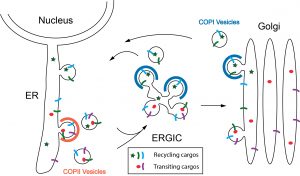Research Projects in the Laboratory

The endoplasmic reticulum (ER) is an essential organelle in eukaryotic cells. This is the place where the majority of secretory proteins and transmembrane proteins are synthesized. These proteins are packaged into COPII transport vesicles and then routed to the secretory pathway. Proper assembly of COPII vesicles is essential for cell viability and animal development. My laboratory studies the mechanism of COPII vesicle assembly and diseases such as craniofacial dysplasias and osteogenesis imperfecta caused by defects in this process.
Accumulation of incorrectly folded proteins in the ER triggers a series of stress responses called the unfolded protein response (UPR) which involves signaling receptors such as PERK, IRE1 and ATF6. The UPR helps cells to fold proteins, to limit the synthesis of secretory proteins, and to remove misfolded proteins under the stress. An aberrant UPR is involved in vastly different human diseases including diabetes, skeletal dysplasia, and myopathies. We study how UPR dysregulation contributes to such different diseases.